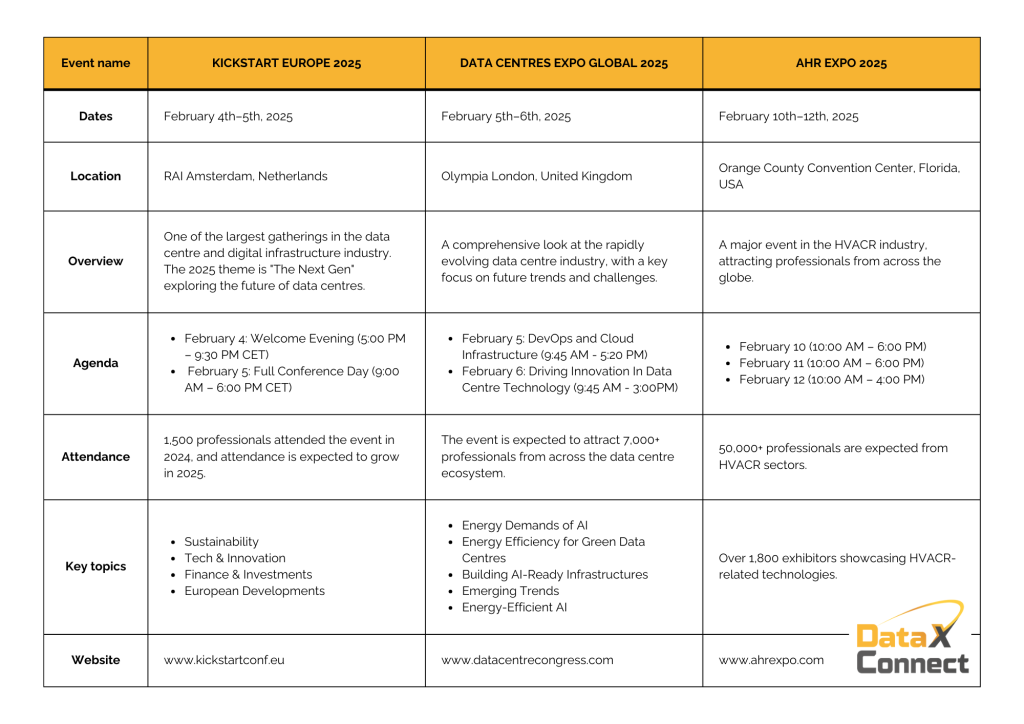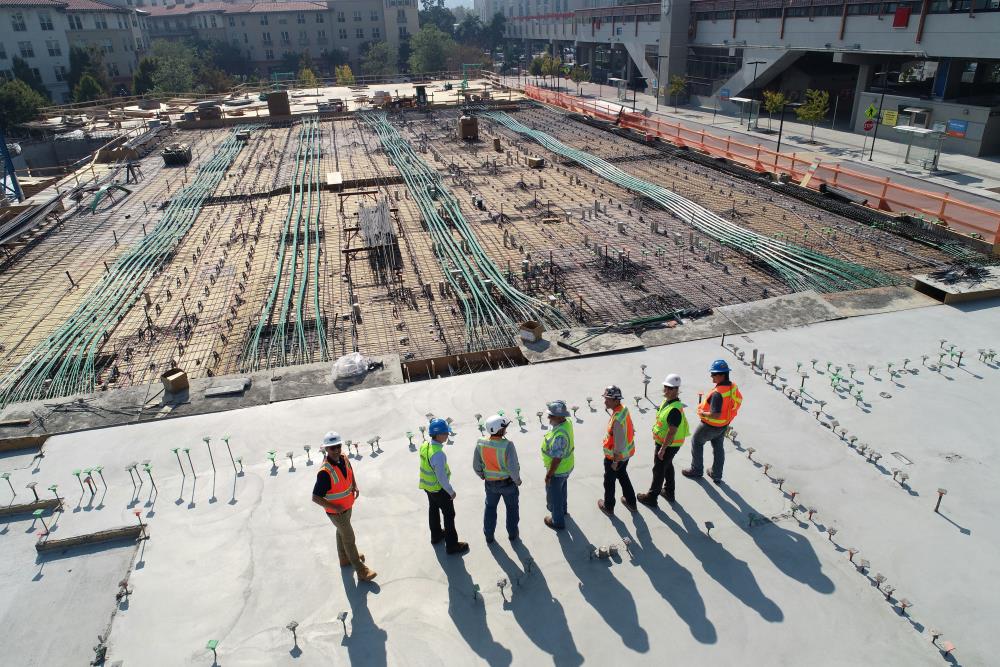The Soben Data Centre Trends 2025 report highlights the rapid evolution of the data centre industry, driven by AI adoption, power constraints, sustainability efforts, and shifting global priorities.
As demand for computing power surges, data centres are expanding into new regions, embracing renewable energy, nuclear power, and innovative cooling solutions to meet increasing energy requirements.
Meanwhile, labour shortages and the need for new project management approaches are reshaping how data centres are designed and built. We’ve summarised the key points from the report below.
Summary
- AI: Pause for Thought – AI-driven data centres are growing at an unprecedented rate, requiring massive power and infrastructure while reshaping industries like healthcare, finance, and robotics.
- More On-Site Power Generation – Power shortages are delaying data centre projects, leading to increased investment in microgrids, hydrogen, and natural gas as interim solutions.
- The Pull of Renewables – The shift to renewable energy sources like hydropower and wind is accelerating as data centres seek carbon-neutral operations, with European and Middle Eastern governments leading the way.
- New Hotspots Emerge – Data centre development is shifting to new regions with renewable energy and available land, including the Nordics, Spain, and the US Midwest, while Scotland emerges as a future hub.
- Driving Nuclear Small Modular Reactors (SMRs) – Tech giants like Amazon, Microsoft, and Google are investing in nuclear power, particularly SMRs, to secure sustainable long-term energy for data centres.
- All Change in Cooling – Higher-density AI computing is pushing liquid cooling adoption, while waste heat reuse and carbon capture are gaining traction for energy efficiency.
- Shifting Rules of Engagement – A shortage of competent general contractors is driving new project management models like PMC (Project Management Consultant) and long-term partnerships with key contractors.
- Ongoing Skills Shortages – The industry faces a severe talent gap across engineering, construction, and trades, requiring significant investment in training and upskilling initiatives.
- Beyond Tax Breaks: Attracting New Data Centres – Governments are moving beyond traditional tax incentives, streamlining planning approvals, power access, and fibre connectivity to attract data centre investments.
- AI to the Rescue – AI and automation are being used to optimise data centre design, construction, and operations, improving efficiency in areas like cooling, scheduling, and predictive maintenance.
New data centre locations
The declining power availability in established data centre markets and the push for decarbonisation are driving data centre operators to new locations with ample renewable energy, land, and connectivity.
The Nordics (Norway, Finland, Denmark, Sweden, Iceland) are seeing significant investment due to their hydropower resources and cool climates.
Spain, Italy, Belgium, Poland, and Austria are experiencing activity as Tier 2 and Tier 3 data centre hubs.
The newest market poised to emerge in Europe is Scotland. Already generating more power from renewable sources than it uses. Connections and proximity to subsea data cables, and its cooler climate.
In the US, power constraints are pushing developers to Indiana, Minnesota, Nebraska,
Meanwhile, the Middle East is witnessing a race between Qatar and Oman to become the region’s leading data centre hub, fuelled by bold investments in renewable energy and digital infrastructure.
Ongoing skills shortage
The data centre industry is facing a severe shortage of skilled professionals, from leadership and management staff to electricians, HVAC technicians, and plumbers, leading to rising labour costs and project delays.
The demand for experienced workers with both construction and data centre expertise far exceeds supply, particularly in new and emerging markets. The ageing workforce and lack of younger talent entering the industry exacerbate the issue, while the rise of new technologies like BIM and smart building systems creates additional skill gaps.
To address these challenges, contractors and hyperscalers like Amazon are investing in upskilling programmes, apprenticeship programmes, and early-career development initiatives to attract and train the next generation of data centre professionals. The Digital Futures Programme, based at UK UTCs, is one such initiative aiming to attract more young people to the sector.
As the data centre industry continues to evolve, businesses and governments must adapt quickly to keep pace with AI-driven demand, energy constraints, and workforce shortages.
The emergence of new hotspots, investment in alternative power sources, and the adoption of advanced automation will be critical in ensuring long-term sustainability and efficiency.
With collaboration, innovation, and strategic planning, the industry can overcome its challenges and position itself for continued growth in an increasingly digital world.
More insights
- Is the Data Centre Industry Doing Enough for Women?

- Why Data Centres Are Becoming a Magnet for Young Talent

- Retaining Great Data Centre Talent Is Not Just About Pay

Inside Data Centre Podcast
Subscribe to the DC Digest
Your fortnightly update on everything going on in the data centre industry, all in one place.
Other insights
-
Is the Data Centre Industry Doing Enough for Women?
We’ve known for a while that a gender imbalance exists in the data centre world. But when only 8% of respondents to our 2025 Data Centre Salary Survey were female – roughly one in twelve – it brought that reality into sharper focus
-
Why Data Centres Are Becoming a Magnet for Young Talent
Young professionals are being presented with the opportunity to be part of a lucrative and rapidly-evolving sector. In our 2025 Data Centre Salary Survey, 1,500 people from around the world shared their compensation packages and feelings towards the sector.
-
2025 Data Centre Salaries
DataX has today, on National Data Centre Day, released the results of its 2025 Data Centre Salary Survey, marking the company’s fifth birthday with its most comprehensive report to date.
-
Shaping Future Talent at UTC Swindon
Activate Learning Education Trust (ALET) are wrapping up the academic year with a series of high-energy Challenge Days, one of which was at UTC Swindon.
-
The Data Centre Power 50
We’re proud to share that Andy Davis, Director at DataX Connect and host of the Inside Data Centre Podcast, has been named in the Datacloud Global Power 50 – a list that recognises 50 of the most influential figures shaping the future of the data center industry.
-
Power, Pricing, and Pipeline: CBRE Report 2025
This article summarises the key takeaways from CBRE’s Global Data Centre Trends 2025 Report, exploring the state of power, inventory, vacancy, absorption, and availability across global markets.
















Leave a Reply